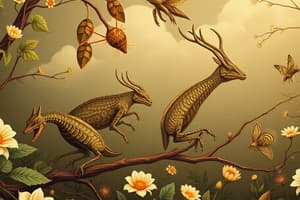Podcast
Questions and Answers
Who is credited with proposing the theory of evolution by natural selection?
Who is credited with proposing the theory of evolution by natural selection?
- Charles Darwin (correct)
- Louis Pasteur
- Gregor Mendel
- Thomas Morgan
What is the term that describes the process by which new species arise from existing species?
What is the term that describes the process by which new species arise from existing species?
- Genetic drift
- Speciation (correct)
- Gene flow
- Mutation
What is an example of an adaptive trait?
What is an example of an adaptive trait?
- Having brown eyes
- Being taller than average
- Having webbed feet (correct)
- Having a high IQ
What mechanism of evolution involves the random change in allele frequencies in a population?
What mechanism of evolution involves the random change in allele frequencies in a population?
What is the primary source of genetic variation in a population?
What is the primary source of genetic variation in a population?
Which type of selection favors extreme phenotypes over the average or intermediate phenotypes?
Which type of selection favors extreme phenotypes over the average or intermediate phenotypes?
What is an example of co-evolution?
What is an example of co-evolution?
What is the term for the process by which species evolve from a common ancestor and become increasingly different over time?
What is the term for the process by which species evolve from a common ancestor and become increasingly different over time?
What is an example of homologous structures?
What is an example of homologous structures?
What is the term for the study of the geographic distribution of species?
What is the term for the study of the geographic distribution of species?
What is an example of artificial selection?
What is an example of artificial selection?
What does the fossil record provide evidence for?
What does the fossil record provide evidence for?
What type of evolutionary process occurs when different species develop similar characteristics in response to similar environmental pressures?
What type of evolutionary process occurs when different species develop similar characteristics in response to similar environmental pressures?
What is the study of the evolutionary history and relationships between species called?
What is the study of the evolutionary history and relationships between species called?
What type of reproductive isolation occurs when two populations are capable of mating but have differences in behavior or mating rituals?
What type of reproductive isolation occurs when two populations are capable of mating but have differences in behavior or mating rituals?
What is the term for the presence of similar genes in different species?
What is the term for the presence of similar genes in different species?
Which of the following is NOT a characteristic of the Hardy-Weinberg equilibrium?
Which of the following is NOT a characteristic of the Hardy-Weinberg equilibrium?
What type of reproductive isolation occurs when two populations are capable of mating but have differences in their mating times or breeding seasons?
What type of reproductive isolation occurs when two populations are capable of mating but have differences in their mating times or breeding seasons?
Which of the following factors can contribute to the formation of new species?
Which of the following factors can contribute to the formation of new species?
What type of reproduction isolation occurs when two populations are separated by a physical barrier?
What type of reproduction isolation occurs when two populations are separated by a physical barrier?
What is the term for the accumulation of small genetic changes in a population over time?
What is the term for the accumulation of small genetic changes in a population over time?
Which type of selection favors individuals with intermediate phenotypes and acts against extreme phenotypes?
Which type of selection favors individuals with intermediate phenotypes and acts against extreme phenotypes?
What is the term for the process by which species evolve together in response to changes in each other over time?
What is the term for the process by which species evolve together in response to changes in each other over time?
Which concept suggests that evolution occurs in short bursts of rapid change followed by long periods of little change?
Which concept suggests that evolution occurs in short bursts of rapid change followed by long periods of little change?
Flashcards are hidden until you start studying



